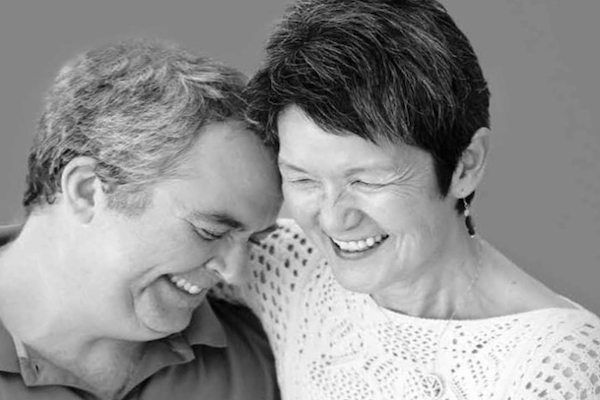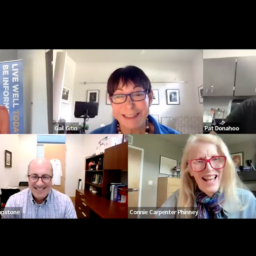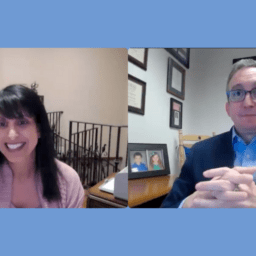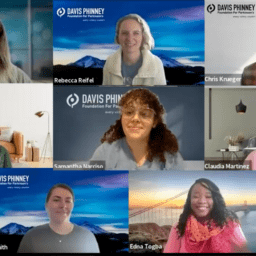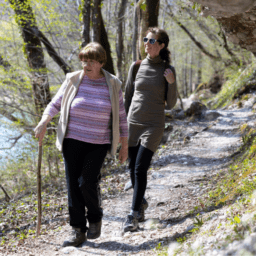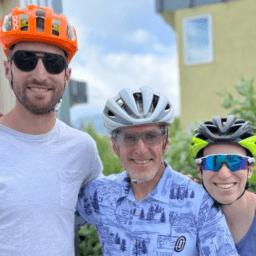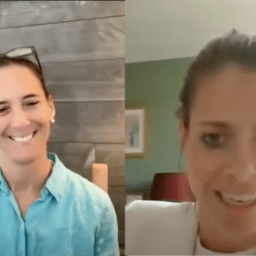Photo care of World Parkinson Coalition®
In honor of our celebration of Parkinson’s care partner week, we sat down with two Davis Phinney Foundation ambassadors, Brian and Lily Reedy, to talk to them about what life has been like since diagnosis and how they’ve adjusted to the new roles they play in each other’s lives.
Here’s what they had to say.
DPF: Brian, what were your initial symptoms and when were you diagnosed?
Brian: I was in a car accident in 2008. I was hit from behind and suffered a traumatic brain injury. A year later, I was still showing neurological symptoms that weren’t necessarily aligned with a traumatic brain injury. For example, my right arm wouldn’t swing when I walked, I had a hard time multitasking and my depth perception was severely compromised. It was a daily challenge to filter out what symptoms were the result of the traumatic brain injury and which were related to another, at the time, unknown cause. It took two years before I was officially diagnosed with Parkinson’s. I learned during this process that I had a genetic predisposition to get Parkinson’s, and it was the traumatic brain injury from the accident that brought it on earlier.
On the one hand, it was a relief because we’d been through so much as we tried to figure out what was wrong; on the other hand, it was tough to come to terms with the fact that I had a disease I would have to live with for the rest of my life.
DPF: Lily, what was your role in the early days of Brian’s diagnosis?
Lily: Initially, one of the most obvious ways Brian’s life was affected was his declining ability to continue as a high school teacher of the caliber he was used to. In the classroom, he struggled a lot with multitasking, something that had been a strength of his for so long. After work hours and weekends were spent trying to keep up with the workload. Together we worked round the clock and even with my help there was never enough time to give the students all he desired. Eventually, after three years, he retired.
Early on, he lost confidence in his math skills, so I took over our finances. When sudden fatigue became a safety issue, I took over as the designated driver. At doctor’s appointments, I was his note taker and advocate.
These early days were filled with questions about the disease. I spent many hours researching and seeking answers. The more I learned, the less fear I felt. Knowledge is power.
Our lives had changed and were challenging at times, but many important and good things still remained the same. Brian’s silliness, passion for community service and his deep love of family and friends remained intact and still remain safe from the grips of Parkinson’s.
Brian: I remember when the doctor said, “Lily will be your caregiver.” Lily gently corrected him and said, “No, I’m your care partner. We’re in this together.” And that is the way it has always felt. I never once worried about Lily taking care of me, but I did worry about her not taking care of herself.
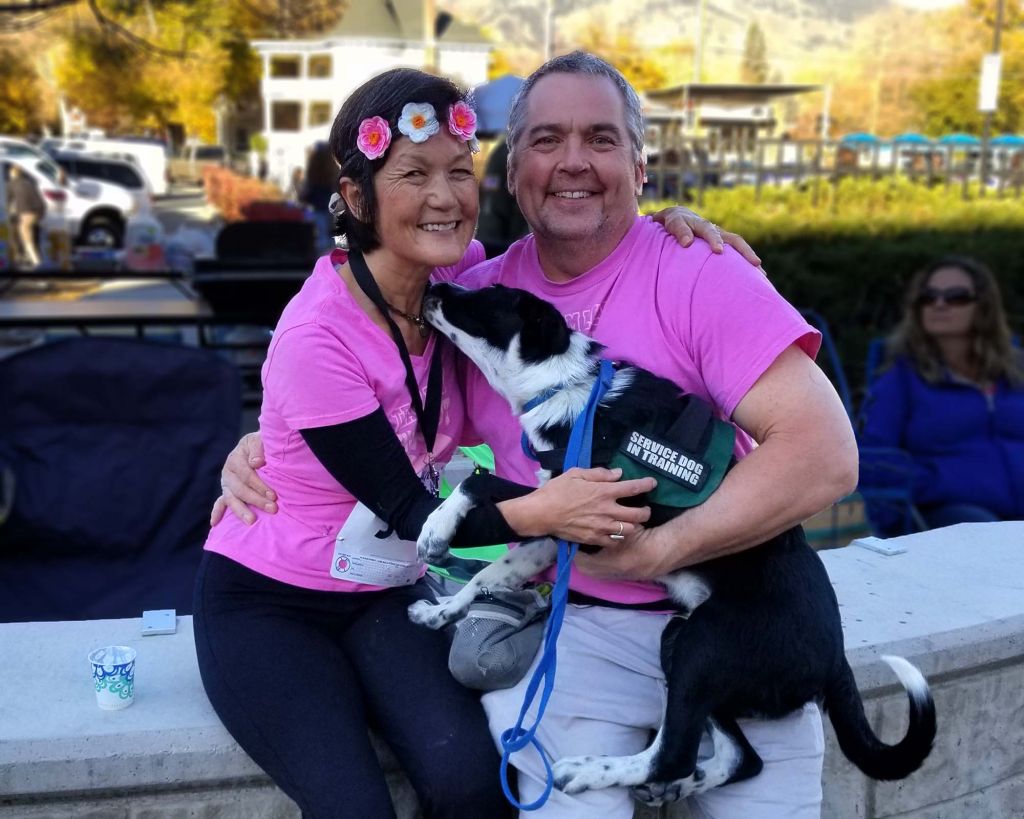
DPF: Lily, how do you take care of yourself?
Lily: A lot of care partners feel there is little time or energy to take care of themselves, even though we know we should. As we get older, there are added responsibilities for aging family as well. It’s easy for any of us to feel overwhelmed. That’s why we need to make self-care a priority by taking time to exercise, eat healthfully and make sure things that make you happy are part of your to-do list. Claim time to read a couple of chapters of a book, or plan a breakfast out with friends. When I do something nice for myself, I feel recharged and enjoy a brighter perspective.
Each morning I go for a one to one and a half hour hike with my dogs. It helps me clear my head, breathe in the fresh air and get my heart pumping. I return home and feel renewed and ready to face whatever the day brings. When I take time for myself, my energy, patience and sense of humor are refueled. As Brian likes to joke, “happy wife, happy life.”
DPF: In your work as Davis Phinney Foundation ambassadors, what do you see care partners struggle with the most?
Brian: It seems that the biggest problem is that care partners get overwhelmed and end up not taking care of themselves. The second thing is they struggle with communicating and resolving conflicts, which can harm relationships. Whenever we talk about this in groups, I always invite people to keep talking and remember that none of us are alone in this. We can have the hard conversations and respect each other’s wishes even if we don’t always agree with each other.
Lily: I just recently started a coffee and conversations group for care partners. There are seven of us who are all at different stages of this journey. It’s so refreshing to talk to others who are in the same boat. We listen, support and encourage each other. It’s always a good reminder to know we’re not alone because when you’re in the middle of the tough times, it often feels like you are.
A common concern at our care partner group is how to navigate the role switch from spouse to care partner. In the early stages, it’s not as big of a challenge. However, when your person with Parkinson’s starts to decline, it’s sad and lonely and heartbreaking to realize that most of your day is spent as a care partner. That’s not a smooth transition to accept, for either of the people involved.
DPF: If you were speaking to a room of 1000 Parkinson’s care partners right now, from new care partners to those who have been in this role for a long time, what would tell them that might help them along this path?
Brian: First, you have to have complete faith and trust in your care partner. There are a lot of things that happen to you as a person with Parkinson’s that are scary and accepting decline is humbling. You have to trust your partner enough to communicate your fears with them instead of keeping it all bottled up inside.
Second, when you do things that are very out of character for you, don’t feel shame and don’t beat yourself up about it. When you’re open about what’s going on, your feelings will have less power. There are a lot of side effects of the medications, and you’ll say and do things you wouldn’t usually do. Talk about this with your care partner or your doctor and see what can be done. Open, honest and vulnerable communication will make all the difference.
Lily: One of the most important lessons I’ve learned is that Parkinson’s affects my person with Parkinson’s view of himself. He fights daily to retain the life and abilities he feels slipping away. In the past, he has described his day as if he is walking on Swiss cheese; sometimes he just falls into a hole.
Our relationship required more patience and calm once Parkinson’s was added to the mix. Making the call that a decision he’s made is unsafe or in bad judgment is a responsibility I take seriously. As you can imagine, this could be a very frustrating and infuriating situation for Brian. What I’ve learned is that a kind tone of voice goes a long way. This doesn’t mean my opinion or stance on an issue is subdued or diluted; it just means the delivery of the message is voiced with kindness. Accepting limitations and being corrected is difficult for anyone and even more so for a person with Parkinson’s. I do my best to be understanding and to respect the freedom he needs to keep pushing forward and assist only when needed.
The other piece of this care partner puzzle that I believe needs a great deal more attention is the side effects that may occur when taking Parkinson’s medications. Some of the side effects that people with Parkinson’s experience are severe and when you see these side effects in action, it’s hard to remember that this is not indicative of who they are as a person, but instead, it’s a behavior that’s occurring because of the medication they’re taking.
Watch for red flags, be informed and talk openly with your neurologist or movement disorder specialist. Ask them why they’re prescribing a specific medication or why they are increasing the dosage. Request they review the potential side effects and ask about alternative medications, if you have concerns. Two examples of severe side effects we’ve dealt with are sudden sleep attacks (while driving) and obsessive behavior. Remember you are not alone.
DPF: We’re so appreciative that you were willing to share your story with us. What are you most looking forward to now and how can people connect with you?
Brian: Right now I’m loving training my dog, Dempsey, and I’m looking forward to taking on some physical challenges that I hope I’ll get to tell you all about soon. Aside from that, I’m just always grateful that I have such an amazing, kind and patient care partner. There’s nobody else in the world I’d rather be traveling this path with.
Lily: We’ve become very good at living in the present because that’s when we know we are living well. We continue to set goals and look forward to achieving them, and we love the opportunities we have to share our story and hopefully make this journey easier for others.
We’d love to connect with anyone who could use support as a person with Parkinson’s or a care partner to someone who is living with Parkinson’s. Our work as ambassadors for the Davis Phinney Foundation is some of the work we love the most, and we invite anyone to reach out. You can reach out to Brian here and me here.
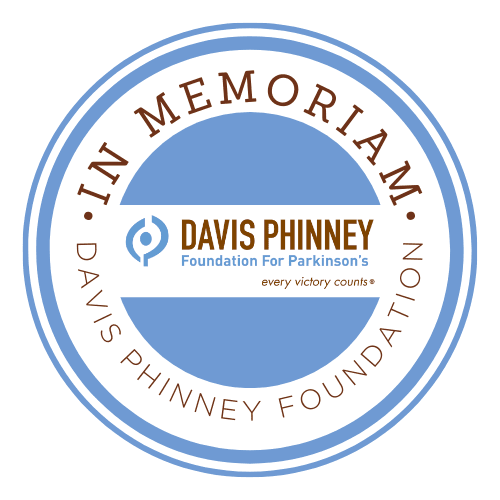 We are saddened to share that Lily Reedy passed away from metastatic breast cancer on July 13, 2020.
We are saddened to share that Lily Reedy passed away from metastatic breast cancer on July 13, 2020.
Though you are no longer with us, Lily, you will never be forgotten. Thank you for being a friend and for the legacy you left to the Parkinson’s community and care partners everywhere.
More Posts in the Parkinson’s Care Partner Series
Rewriting the Rulebook for Parkinson’s Care Partners
The Big 16: What to Say (And What Not to Say) to Someone Who Has Parkinson’s
The Parkinson’s Care Partner’s Digital Toolbox
How to Stay Healthy and Avoid Burnout as a Parkinson’s Care Partner
Get the every victory counts manual for care partners
Do you have the Every Victory Counts Manual for Care Partners! Released in 2021, this resource is available at no cost in print and digital versions. To learn more and request your copy, click here.


